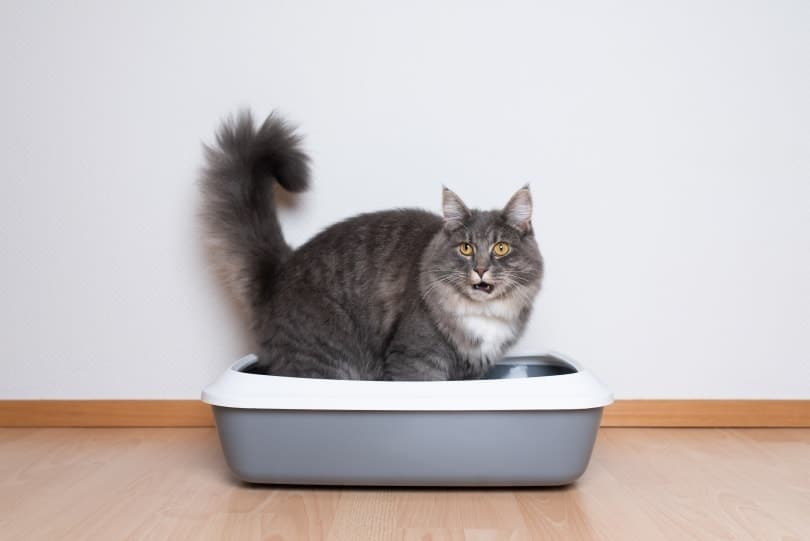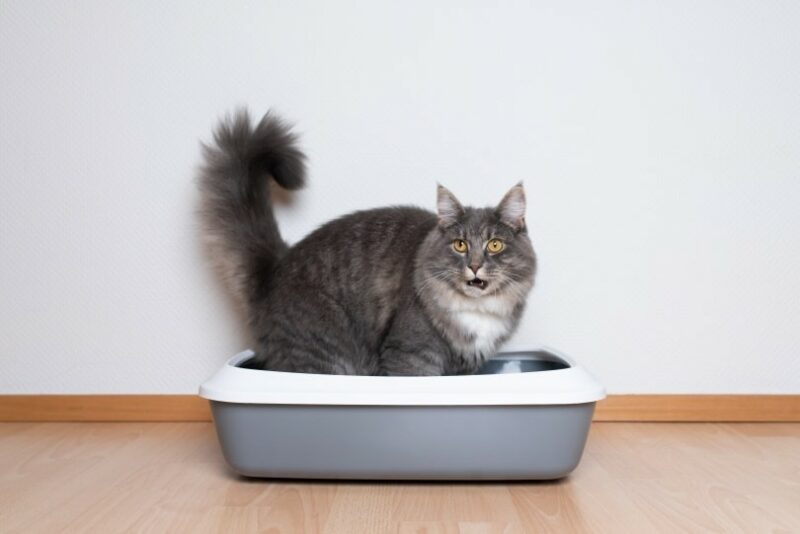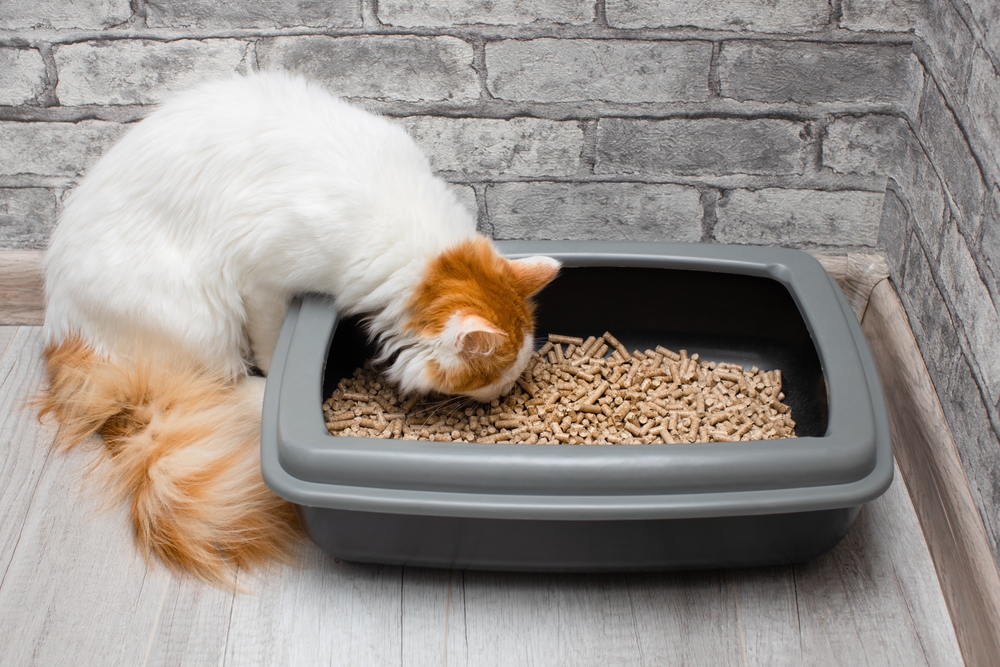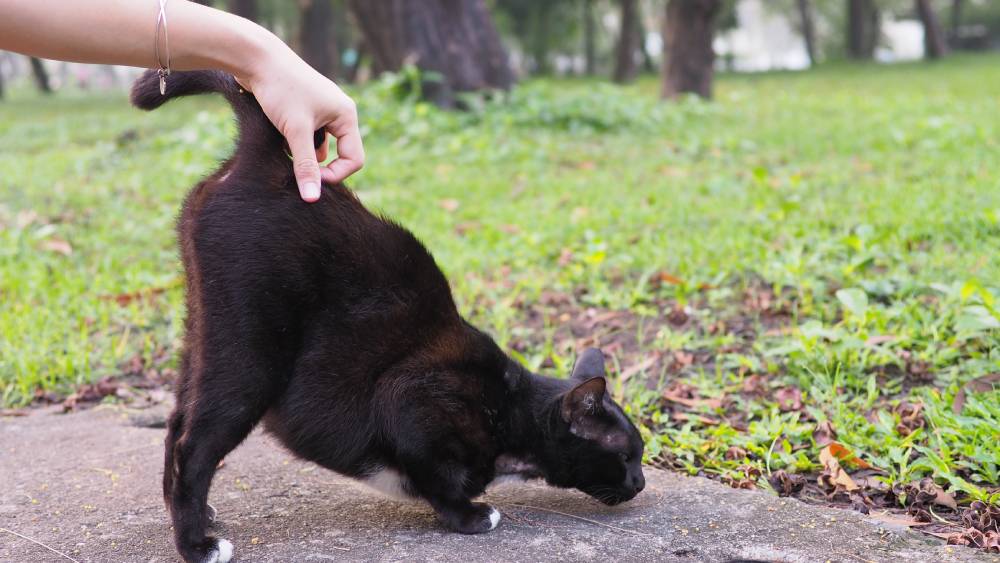Most of the time, you won’t notice if your cat has gone to the toilet because they are usually very silent. However, sometimes, going to the bathroom is noisy, leaving cat owners wondering what the fuss is about. Cats meow to their humans for various reasons, but have you ever wondered why a cat might meow in the litter box? Is it a cause for alarm? Is it normal?
If your cat meows in the litter box, take it very seriously, as it could be a medical issue or even a behavioral issue. On the other hand, it could be normal, as your cat may simply be informing you of its duties (no pun intended).
Nonetheless, if the meowing is new, you must figure out why your cat is meowing in the litter box. Join us as we investigate the five common reasons so you have the necessary information.
Important information: If you see your cat trying to urinate unsuccessfully, and you see them spending more time than usual in their litter box, changing posture, vocalizing, or making frequent trips or attempts to urinate, contact your veterinarian immediately, as ignoring this can have fatal consequences.
The 6 Reasons Why Cats Meow in Their Litter Box
1. The Litter Box Is Dirty
Humans don’t like to go to the bathroom in dirty places, and cats are no different. Your cat may be meowing because they’re telling you of their displeasure about your litter box etiquette.
In some cases, a cat will go outside the litter box, which indicates it’s time to clean the litter box. If you’ve cleaned the litter box, but your cat is still meowing, it’s probably related to one of the other issues below.
If you're dealing with stubborn smells in your litter box or elsewhere in your house, a good cat litter deodorizer can work wonders.
- Bio Enzymatic Cat Litter Freshener - Smart formulation uses natural ingredients eliminating cat...
- Save Money - Stuff for cats isn’t the cheapest. With this litter box odor eliminator, you’ll...
- Every Litter, Every Surface - Are you afraid this additive won’t work on your litter? Fear not!...
We recommend Hepper's Advanced Bio-Enzyme Cat Litter Deodorizer, an all-natural litter additive that fights odors using bio-enzymes. This effective deodorizer is fragrance-free and works on all types of cat litter. It's also effective anywhere you have lingering odors, including diaper pails, garbage cans, and kennels!
At Catster, we’ve admired Hepper for many years and decided to take a controlling ownership interest so that we could benefit from the outstanding designs of this cool cat company!
2. Your Cat Doesn’t Like the Litter Box
Cats are finicky creatures, and there are several reasons why your cat may be meowing. But why would your cat not like the litter box? Let’s break it down.
You’ve Changed the Litter Type
If you’ve recently changed the type of litter you normally use, it could be the reason. Cats usually don’t like change, and your cat could be telling you to change back to the litter you were using before. Maybe your cat doesn’t like the size or smell of the new litter. If you’ve recently changed the type of litter, try going back to the old one.
Your Cat Doesn’t Like the Size of the Litter Box
If the litter box is too small, your cat may meow while going to the bathroom. As your cat grows, they’ll outgrow the litter box, so keep that in mind, especially if you have a kitten. Some cats may not like covered litter boxes; if you have a hood on the litter box, your cat may protest by meowing.
The Quantity of Litter Is Not Suitable
Normally, 1–2 inches will suffice for a litter box. If the litter is too deep or shallow, your cat will let you know by meowing.
Not Enough Litter Boxes
For a multi-cat household, you need multiple litter boxes. The rule of thumb is each cat should have its own litter box, plus one extra. This applies even if you usually see them all using the same one! For example, if you have three cats, you’ll need four litter boxes to keep their potty time quiet and less stressful.
Your Cat Doesn’t Like the Location of the Litter Box
Sometimes, especially if you move the litter box, your cat will be displeased with the new location. Avoid placing the litter box where there is a draft or noisy appliances, and avoid spots close to windows or cat flaps.
If you have a dog, avoid placing it where your dog will snoop around. Also, avoid high-traffic areas in the home, like corridors or near doors. The ideal location to place the litter box is a quiet, hidden area where your cat can feel comfortable, safe, and private.
3. Your Kitty Wants a Reward
Cats usually have the instinct to use the litter box without you having to give them a reward to encourage the behavior. Like dogs, you can train your cat with positive reinforcement by offering rewards, such as treats. If you’ve stopped the reward system, your cat could be telling you that that’s not fair and they want a treat!
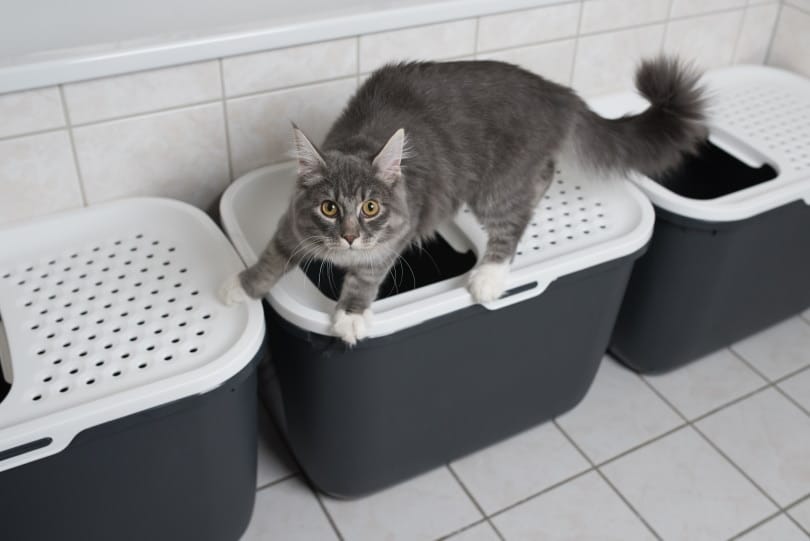
4. Your Cat Is Stressed
Several factors can bring on stress. Any change in your cat’s daily routine can cause stress. Some typical reasons your cat may be stressed are:
- New people/baby in the home
- Moved into a new home
- Renovations to the home
- Change in your cat’s diet
- Being attacked/bullied by another pet in the home
- Seeing a cat outside the window
- Loss of a loved one/caretaker
5. You Have a Chatty Cat
Some cats are simply more vocal than others, and some do not discriminate against being chatty while using the restroom. This applies if your cat has always been vocal, but regardless, don’t wave it off as just a chatty cat.
You can look for signs that something else is wrong by observing when your cat meows while using the litter box. For example, is the meowing occurring before, during, or after?
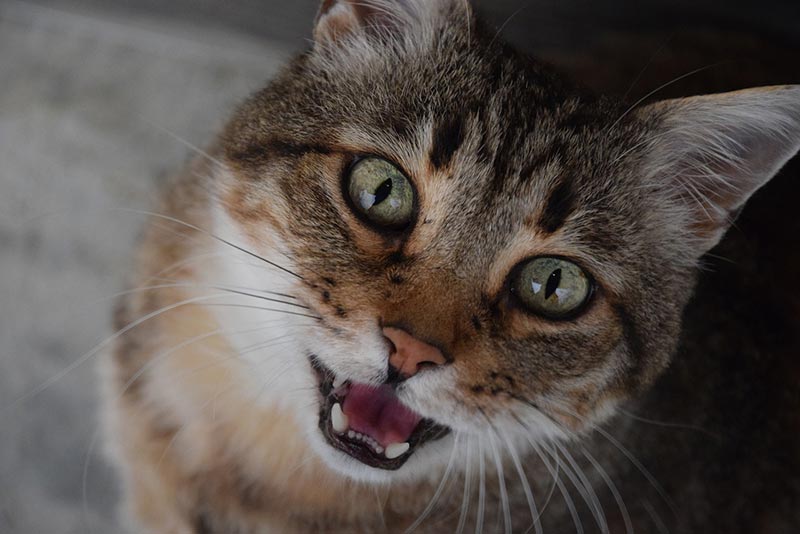
6. Your Cat Has a Medical Issue
Last but not least, a medical issue could be why your cat meows while using the litter box. Several medical issues could be the cause, and if so, you must take your cat to your veterinarian as soon as possible. Litter box problems related to their urinary tract are one of the most common life-threatening problems for cats. Here are some possible medical issues:
Cystitis/FLUTD
The broad term for any issue related to inflammation of the cat’s urinary tract is feline lower urinary tract disease (FLUTD). FLUTD is a general term associated with inflammation of the bladder and urethra that does not specify the exact cause of the inflammation.
Difficulty urinating, urinating more frequently or outside the litter box, hematuria (blood in the urine), foul-smelling urine, cloudy urine, and excessive licking and grooming are all signs your cat could have a bladder issue. Your cat may eventually develop a urinary blockage, which poses a life-threatening risk.
The reasons can be bladder stones, bacterial infections, urethral plugs, idiopathic cystitis, cancer, and anatomical problems. Your vet will let you know what is causing the problem and provide treatment for each cause.

If you need to speak with a vet but can’t get to one, head over to PangoVet. It’s an online service where you can talk to a vet online and get the personalized advice you need for your pet — all at an affordable price!
Urinary Tract Infection
Urinary tract infections (UTIs) are caused by bacteria traveling through the urethra and into the bladder. Your cat may try to urinate frequently with little urine passing through, and they may cry out. Blood in the urine or your cat going outside the litter box are common signs. These signs always warrant an emergency appointment with your vet.
A Blockage/Constipation
An intestinal blockage is a medical emergency. Just like dogs, cats can eat something that can get lodged in their intestinal tract. Signs include vomiting, diarrhea, hiding, lethargy, aggression, straining to defecate (hence the meowing), and a smaller-than-usual stool size.
Constipation can be the first sign of dehydration in cats. If your cat is trying to defecate unsuccessfully, ensure you take them to the vet quickly to detect any medical issues as early as possible.
Diarrhea
Diarrhea in cats can be a sign of several issues. Straining to go is a sign, along with obvious loose stools. Your cat may have ingested something toxic, like a poisonous plant, or they could have a virus, bacteria, or worms.
Changing your cat’s diet or a food allergy could also cause diarrhea. A trip to the vet is necessary to understand why it happened and get the right advice.
Impacted Anal Sacs
Although not very common, your cat’s anal sacs can get impacted and cause trouble. Your cat will strain to go to the toilet and may cry out. The fluid in the anal sacs usually releases when your cat has a bowel movement, but if your cat has toilet issues, the fluid will not release.
The result could lead to impacted anal sacs, which is a painful condition. Look for swelling of the anus and excessive licking. If you suspect your cat has impacted anal sacs, your veterinarian can drain them.
Arthritis
Arthritis is a chronic, painful condition affecting the joints and is common in senior cats. Arthritis can undoubtedly hurt your cat while using the litter box. In fact, your cat may start going potty outside the litter box because it’s too painful to maneuver around in the litter box.
Ensure you modify your home and litter box to your cat’s ability to move around. You can buy a litter box with low sides, make it more accessible, and, if applicable, place a litter box on each floor of the house.
Your vet can diagnose and provide a treatment plan for your cat’s arthritis so your kitty can have a better quality of life. A classic tale-tell sign of arthritis in cats is decreased mobility and agility.
Conclusion
Cats meow while using the litter box for many reasons. What’s important is to ensure they’re not experiencing a medical or behavioral issue. Look for signs that your cat is not feeling well, and don’t brush it off as no big deal. Always have your vet check your kitty for litter box-related issues. If it turns out to be behavioral, you’ll be better equipped to resolve the issue.
Featured Image Credit: Nils Jacobi, Shutterstock

